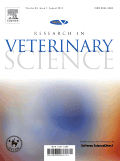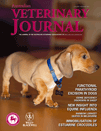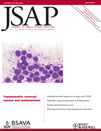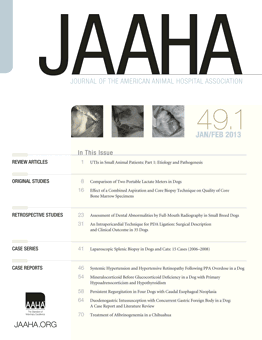
MAGYAR ALLATORVOSOK LAPJA
Scope & Guideline
Advancing Veterinary Knowledge Since 1950
Introduction
Aims and Scopes
- Veterinary Clinical Research:
The journal publishes research that addresses clinical challenges in veterinary medicine, including diagnostics, treatment protocols, and case studies across various species. - Animal Health and Disease Management:
A core aim is to explore the management of animal health, encompassing studies on infectious diseases, antimicrobial resistance, and preventive measures in livestock and companion animals. - Veterinary Education and Professional Development:
The journal emphasizes the importance of education in veterinary science, discussing advancements in veterinary curricula, training programs, and the integration of new technologies. - Animal Welfare and Ethics:
Research related to animal welfare, ethical considerations in veterinary practices, and the legal aspects of animal ownership and care is a prominent focus, reflecting societal concerns. - Innovative Veterinary Techniques:
The journal highlights new methodologies and technologies in veterinary medicine, including advances in diagnostics, surgical techniques, and therapeutic interventions.
Trending and Emerging
- Antimicrobial Resistance and Public Health:
There is a growing body of literature addressing antimicrobial resistance, especially in relation to its impact on public health and animal welfare, indicating a critical response to global health concerns. - Immunology and Vaccination Research:
Emerging themes in immunology, particularly related to vaccination efficacy and new immunotherapeutic strategies, highlight a proactive approach to disease prevention in both companion and livestock animals. - Use of Advanced Technologies in Veterinary Medicine:
The journal increasingly features studies on the application of artificial intelligence, molecular diagnostics, and genetic research, indicating a trend towards integrating technology in veterinary practices. - Holistic and Integrative Approaches to Animal Care:
A rising interest in holistic veterinary medicine and integrative care practices reflects a broader understanding of animal health that encompasses physical, emotional, and environmental factors. - Focus on Exotic and Companion Animal Medicine:
There is an increasing trend to address the specific health needs of exotic and companion animals, showcasing an expanding scope of veterinary practice beyond traditional livestock.
Declining or Waning
- Traditional Veterinary Practices:
There appears to be a decreasing emphasis on traditional veterinary practices that do not integrate modern technologies or research, as the field moves towards evidence-based approaches. - General Animal Husbandry Practices:
While animal husbandry remains a topic, the focus has shifted more towards specific diseases and advanced management techniques rather than broad discussions on husbandry practices. - Historical Veterinary Studies:
Research centered on historical aspects of veterinary medicine and practices has decreased, likely due to a growing emphasis on contemporary issues and future directions in veterinary science.
Similar Journals

CANADIAN JOURNAL OF VETERINARY RESEARCH-REVUE CANADIENNE DE RECHERCHE VETERINAIRE
Fostering Knowledge, Transforming Veterinary PracticeCanadian Journal of Veterinary Research - Revue Canadienne de Recherche Vétérinaire is a leading publication in the veterinary science community, published by the Canadian Veterinary Medical Association. Established in 1986, the journal serves as a crucial resource for researchers and practitioners alike, covering a broad spectrum of topics pertinent to veterinary medicine and animal health. With a current impact factor placing it in Q2 in the Veterinary (miscellaneous) category, it holds a rank of #85 out of 194 in Scopus for general veterinary research, demonstrating its influence and importance within the field. While the journal is not open access, it remains committed to the dissemination of high-quality research that fosters advancements in veterinary practice and education. Based in Ottawa, Canada, it strives to connect the international community of veterinary researchers and professionals through rigorous peer-reviewed articles that advance knowledge and methodologies in veterinary science.

RESEARCH IN VETERINARY SCIENCE
Elevating Standards in Veterinary ResearchRESEARCH IN VETERINARY SCIENCE, published by Elsevier Science Ltd, stands as an authoritative platform in the field of veterinary studies. With its origins dating back to 1965, this prestigious journal is recognized for its contribution to the advancement of veterinary knowledge and practices, boasting a remarkable Q1 categorization in Veterinary (miscellaneous) and ranking 24th out of 194 in the Scopus veterinary general category, placing it in the top 13% of its field. The journal presents a diverse range of research articles that explore critical topics in veterinary science, thereby facilitating evidence-based practices and innovations. Although currently not an open-access journal, it remains highly accessible through institutional and personal subscriptions, allowing researchers, professionals, and students to benefit from its rich collection of studies. As it moves toward 2024, RESEARCH IN VETERINARY SCIENCE continues to be a vital resource for those dedicated to improving animal health and advancing veterinary science.

Journal of Veterinary Research
Fostering collaboration in veterinary research worldwide.The Journal of Veterinary Research, published by SCIENDO, is a leading open-access journal dedicated to advancing the field of veterinary science. Established in Poland and accessible globally since 2012, this journal serves as a pivotal platform for researchers, professionals, and students, promoting the dissemination of high-quality research and innovative findings in veterinary medicine. With a robust impact factor reflective of its Q2 ranking in the Veterinary (miscellaneous) category for 2023, it ranks 54th out of 194 in the general veterinary field, placing it in the 72nd percentile among its peers. The Journal of Veterinary Research explores a wide variety of topics pertinent to veterinary practice, animal health, and research methodologies, making it an essential resource for academics and practitioners alike. Authors benefit from the journal's open-access model, which ensures their research is freely available to a broader audience, thus fostering collaboration and innovation within the veterinary community.

AUSTRALIAN VETERINARY JOURNAL
Pioneering research for a healthier tomorrow.AUSTRALIAN VETERINARY JOURNAL, published by Wiley, is a leading journal dedicated to advancing the field of veterinary science. With a rich history dating back to 1925, this journal has become a vital resource for researchers, professionals, and students interested in veterinary medicine and its diverse applications. As evidenced by its impressive Scopus ranking, placing it in the 67th percentile among General Veterinary publications, and categorized within Q3 of the Medicine (miscellaneous) and Q2 of the Veterinary (miscellaneous) quartiles for 2023, AUSTRALIAN VETERINARY JOURNAL is recognized for its commitment to quality research and impactful contributions. Although not an open access journal, it continues to be an essential platform for disseminating vital findings and innovations within the veterinary community, fostering collaboration and advancement in animal health and welfare.

JOURNAL OF SMALL ANIMAL PRACTICE
Advancing veterinary knowledge for small companions.Welcome to the Journal of Small Animal Practice, a leading publication in the field of veterinary science, dedicated to advancing the knowledge and practice of small animal healthcare. Published by Wiley since 1960, this esteemed journal has established itself as a cornerstone in the veterinary community, boasting an impressive Q1 ranking in the small animals category as of 2023. With a Scopus rank of #5 out of 20, it places in the top 77th percentile, emphasizing its influence and reach within research domains. The Journal of Small Animal Practice serves as a vital platform for disseminating cutting-edge research, clinical studies, and reviews aimed at veterinary professionals and students alike. Although it does not offer open access, the journal's rigorous peer-reviewed process ensures high-quality content that significantly contributes to the field. Join the community of scholars and practitioners who rely on this journal to stay informed on emerging trends and best practices in small animal health.

Open Veterinary Journal
Elevating Veterinary Education with Open InsightsOpen Veterinary Journal, published by the University of Tripoli, Faculty of Veterinary Medicine, offers a vital platform for the dissemination of research in the field of veterinary sciences. With an ISSN of 2226-4485 and an E-ISSN of 2218-6050, this journal has been committed to open access since 2011, allowing for unfettered access to its content, which ensures that researchers, practitioners, and students worldwide can benefit from the latest veterinary research findings. Operating from Libya, it has garnered an important position within the academic community, achieving a Q2 quartile ranking in the scope of veterinary (miscellaneous) and maintaining a Scopus rank of 104 out of 194 within the general veterinary category, indicating its growing influence and reach. The journal focuses on a diverse array of topics pertinent to contemporary veterinary practice, aiming to bridge gaps in knowledge and foster collaboration among scholars and practitioners. As it continues to publish original research and reviews, Open Veterinary Journal stands as a crucial resource for advancing veterinary medicine, supporting innovative research, and enhancing educational outcomes within the profession.

Kleintierpraxis
Exploring the complexities of small animal health.Kleintierpraxis is a prominent journal dedicated to the field of small animal veterinary science, published by M H SCHAPER GMBH CO KG in Germany. With an ISSN of 0023-2076, the journal aims to disseminate cutting-edge research, clinical findings, and advancements in veterinary practices affecting small animals. Although it is categorized within the Q4 quartile for Small Animals in 2023 and holds a Scopus rank of 20 out of 20, its role in providing valuable insights to practitioners, researchers, and students in veterinary medicine cannot be underestimated. The journal covers a wide range of topics pertinent to veterinary care, diagnostics, and treatment methodologies, offering an essential resource for understanding the complexities of small animal health. While currently not open access, Kleintierpraxis continues to be a vital contribution to the veterinary literature landscape from 1996 through 2024, fostering professional development and knowledge within the community.

ACTA VETERINARIA BRNO
Connecting Researchers to Enhance Global Animal HealthACTA VETERINARIA BRNO is a distinguished journal published by the Veterinární a farmaceutická univerzita Brno in the Czech Republic, focusing on innovative and scholarly research in the field of veterinary sciences. With an established history dating back to 1974, this journal has evolved to maintain its relevance in contemporary veterinary research, as evidenced by its inclusion in Scopus and a respectable Q3 rank in the miscellaneous veterinary category. Despite operating under traditional access models, ACTA VETERINARIA BRNO remains a vital resource for researchers and practitioners seeking to advance their understanding of veterinary medicine and related disciplines. With its commitment to publishing high-quality, peer-reviewed articles, the journal serves as a crucial platform for disseminating significant findings, thereby contributing to the enhancement of animal health and welfare globally.

JOURNAL OF THE AMERICAN ANIMAL HOSPITAL ASSOCIATION
Advancing veterinary excellence through insightful research.JOURNAL OF THE AMERICAN ANIMAL HOSPITAL ASSOCIATION (ISSN: 0587-2871, E-ISSN: 1547-3317), published by the American Animal Hospital Association, is a premier resource for veterinary professionals, researchers, and students focusing on the field of veterinary medicine. Established in 1973, this esteemed journal serves as a vital platform for disseminating cutting-edge research and clinical insights in the management and care of small animals, boasting a remarkable Q1 ranking in Small Animals and a Q2 ranking in Medicine (miscellaneous), reflecting its high impact in the field. With a Scopus rank of #6 in the veterinary small animals category and a 72nd percentile standing, it offers valuable content covering a diverse range of topics pertinent to animal health and welfare. Although not open access, the journal provides essential resources that contribute significantly to the ongoing professional development of veterinary practitioners and the broader scientific community, thus solidifying its status as a cornerstone of veterinary literature.

Journal of Veterinary Science
Exploring New Frontiers in Veterinary Science.Journal of Veterinary Science, published by the Korean Society of Veterinary Science, is a distinguished peer-reviewed Open Access journal that has been contributing to the field of veterinary medicine since its inception in 2000. With an E-ISSN of 1976-555X, this journal not only provides critical insights for researchers globally but also maintains a strong presence within the academic community, evidenced by its impressive ranking in the Scopus database, where it stands at 44 out of 194 in the general veterinary category, placing it in the 77th percentile. The journal’s impact factor reflects its rigorous standards and the significance of the research it publishes, all while offering unrestricted access to its content since 2006, which promotes the free exchange of knowledge. Situated in the vibrant academic atmosphere of Seoul, South Korea, the Journal of Veterinary Science aims to advance veterinary research and practice, covering a broad spectrum of topics to inspire students, professionals, and established researchers alike to push the boundaries of veterinary science.